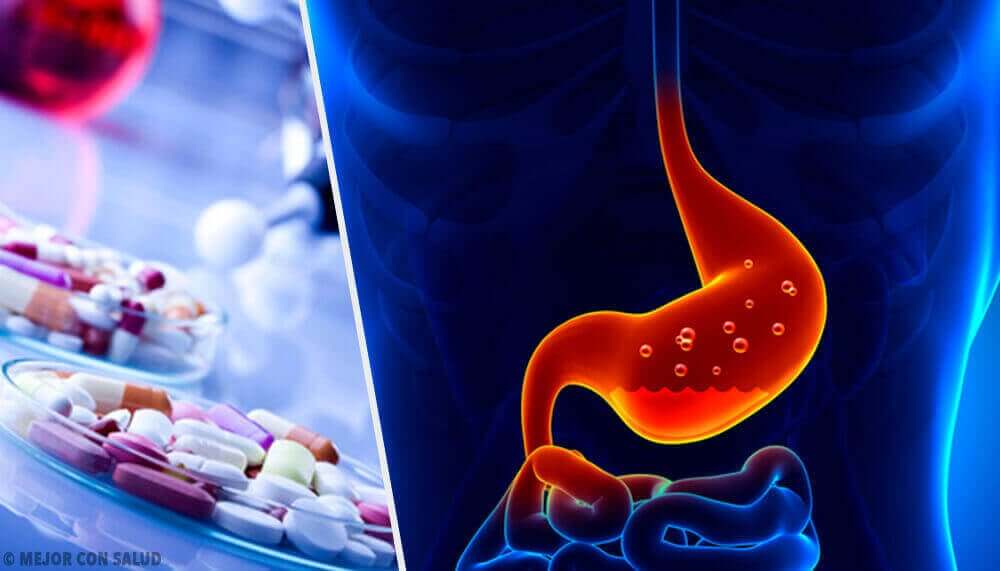The Uses and Effects of Cinitapride

In the following article, we’ll discuss the uses and effects of cinitapride, a medication used for the treatment of gastroesophageal reflux, functional dyspepsia, and irritable bowel syndrome.
Overall, all of these disorders fall under the category of gastrointestinal motility disorders. They have a considerable clinical and social impact and are a frequent reason for consultation in primary care, especially in adults.
What’s more, their incidence in the general population can exceed 20%. Therefore, cinitapride, which belongs to the family of drugs called prokinetics, is very effective in treating all these problems. After all, it stimulates gastrointestinal motility.
What’s gastroesophageal reflux?

Overall, symptoms may incude the following:
- Burning sensation in the chest
- Difficulty swallowing
- Regurgitation of sour food or liquids
- Chronic coughing
- Laryngitis
- New or worsening asthma
With a lifestyle change, it’s possible to reverse GERD. However, some people need additional treatment. This may include the administration of cinitapride or even surgery in the most severe cases.
What about functional dyspepsia?
This is a disorder that affects up to 30% of the general population, and for which cinitapride is a treatment option. Overall, it’s a condition that involves several symptoms, such as:
- Pain or discomfort in the upper abdomen
- Burning sensation, pressure, or fullness
- Nausea
- Early satiety
- Belching
- Distension
This is a fairly heterogeneous disorder. The reason for this is that several causes can lead to a similar clinical picture. In short, dyspepsia is a set of symptoms that originate in the upper gastrointestinal tract when there’s no organic cause or metabolic disease that could explain the symptoms.
Find out more: Nine Healthy Habits to Avoid Digestive Problems
Irritable Bowel Syndrome

- Colic
- Abdominal pain
- Swelling
- Gas
- Diarrhea or constipation
As with reflux, most people with irritable bowel syndrome tend to alleviate their symptoms with lifestyle changes. However, more severe symptoms can be treated with medication, where cinitapride comes into play.
The effects of Cinitapride on the body
As we’ve mentioned, this drug has a prokinetic activity at the level of the gastrointestinal tract by possessing a marked procholinergic action:
- On the one hand, it’s capable of inhibiting the serotonin receptors found in the presynaptic neuron. In this way, the concentration of this neurotransmitter increases and, consequently, the effects of the same.
- At the same time, it also has a slight anti-dopaminergic effect, which contributes to its therapeutic action.
Thus, the cinitapride manages to:
- Accelerate the time of gastric evacuation in patients with a pathological delay of gastric emptying
- Improve the symptomatology of dyspepsia associated with delayed gastric emptying and gastrointestinal transit
- Reduce the amount and duration of reflux episodes as well as the time with esophageal pH below 4
Contraindications for use

The administration of this medicine is totally contraindicated in patients who present hypersensitivity to the active ingredient or any of the following excipients:
- Anhydrous lactose
- Microcrystalline cellulose
- Sodium carboxymethyl starch
- Colloidal silica
- Magnesium stearate
On the other hand, the administration of this medication is also contraindicated in those cases where the prokinetic effects of cinitapride on the gastrointestinal tract could be harmful to the patient. An example of this is in those patients who have hemorrhages, obstructions, or tardive or neuroleptic dyskinesia or perforations.
At the same time, the use of this medicine in children and adolescents isn’t recommended, since there’s no clinical information on the safety and effects of cinitapride in this population group.
Similarly, there’s no data on the use of cinitapride in pregnant women. Animal studies don’t suggest direct or indirect harmful effects in terms of reproductive toxicity. However, it’s best to exercise caution and avoid the use of cinitapride during pregnancy. That said, if use is necessary, it’s up to the physician to assess the risk/benefit ratio.
Conclusion
Overall, Cinitapride is a drug widely used to treat various digestive disorders, such as functional dyspepsia. It’s important to note that it’s contraindicated in several situations.
Therefore, you should consult your doctor or pharmacist about your condition before using it. That way, you’ll be able to avoid complications for your health.
All cited sources were thoroughly reviewed by our team to ensure their quality, reliability, currency, and validity. The bibliography of this article was considered reliable and of academic or scientific accuracy.
- González, J. C. (2014). Procineticos. Acta Gastroenterol Latinoam.
- Grande Posa, L., Lacima Vidal, G., & Perez Campos, A. (1992). EFECTO DE CINITAPRIDA SOBRE EL REFLUJO GASTROESOFAGICO EN PACIENTES CON ESOFAGITIS. ESTUDIO ALEATORIZADO, CONTROLADO Y A DOBLE CIEGO. Gastroenterologia y Hepatologia.
- Portincasa, P., Mearin, F., Robert, M., Plazas, M. J., Mas, M., & Heras, J. (2009). Eficacia y tolerabilidad de cinitaprida en el tratamiento de los pacientes con dispepsia funcional y vaciamiento gástrico enlentecido. Gastroenterologia y Hepatologia. https://doi.org/10.1016/j.gastrohep.2009.06.013
This text is provided for informational purposes only and does not replace consultation with a professional. If in doubt, consult your specialist.








